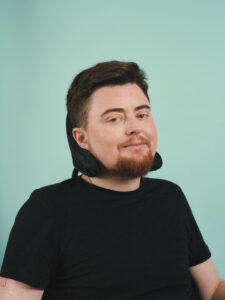I am delighted that we are announcing the longlisted and shortlisted writers for the inaugural Disabled Poets Prize.

Many pieces were compelling, welcoming, and challenging. I was struck particularly by the lushness and expansiveness of metaphor. There was a real the sense of change and transformation that was woven through people’s work.
Jamie Hale – Founder and Judge
I am delighted that we are announcing the longlisted and shortlisted writers for the inaugural Disabled Poets Prize. We received almost 200 applications across best single poem prize and best unpublished pamphlet prize. Of those, 12 were longlisted for each award, and 6 longlisted writers were shortlisted. The shortlist has now been announced and can be found here, or on the website of our partner Spread the Word.
The writing was judged anonymously and the quality was very high overall. Reading and judging alongside Romalyn Ante and Peter Raynard was fascinating. It’s always so interesting in the judging process to discuss work by other writers, and I find it creatively challenging, as well as intellectually. I very much enjoyed finding our shared opinions on pieces, as well as the areas in which we disagreed. Shortlisting together became a very interesting process, given that there were strong areas of divergence as well as agreement as we addressed the work.
Entries to the Disabled Poets Prize
I very much enjoyed the range of themes presented. Whilst some work dealt explicitly with disability, it seemed like nature was the primary source through which many people were writing. This led to a wide range of creative engagements with different aspects of the natural environment and traditions of writing about nature.
There was a lot of depth of imagery. Many pieces were compelling, welcoming, and challenging. I was struck particularly by the lushness and expansiveness of metaphor. There was a real the sense of change and transformation that was woven through people’s work.
Reflections on the submissions to the Disabled Poets Prize
Some of the key technical challenges I faced as a judge were around entry criteria. These arose where entrants had left their name on their work, or exceeded page or line-length limitations. It’s always difficult to select and shortlist work. This was made more so when there was excellent work that simply wasn’t eligible for the award. Next year I would like to ensure that we explain these criteria more clearly.
When reading the work, there were two key areas in which I found writers struggled with – form and editing. This applied both to single poems and to pamphlets. It sometimes felt like content followed form. Work was sometimes overly bound to a specific form or rhyme scheme in a way that constrained the growth of the poem as a whole.
With editing, some work felt like it needed a process of ‘tightening’ and for writers to trust that their work conveys the meaning it needs to, without the obligation to demonstrate that again at the end. From my own experience, both of these areas are places I’ve definitely struggled, and where peer support has very much helped me overcome them.
Resultantly, I am very pleased that the deaf and disabled writers’ salon will be continuing in 2023. There will be a workshop, reading, and open mic for deaf and disabled writers every month. I very much hope that writers who entered this prize will experience that as a place to come to in order to develop their craft.
Best poem performed in BSL
Disappointingly for all of us, there were no entrants to the best poem performed in BSL prize. This has really highlighted the lack of support and development available for poets working in BSL. Coming away from the prize, I strongly believe that there is a clear need for investment into deaf writers at all levels. We need further work to support people in preparing for opportunities such as these.
I hope a range of organisations will be able to come together in the new year to create some form of programme or opportunity dedicated for, and run by, Deaf BSL signing writers specifically.
